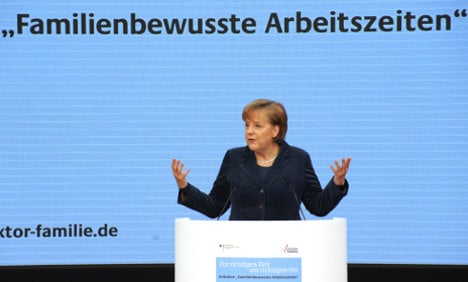Speaking at a conference devoted to balancing career and family, Merkel said that despite a voluntary agreement a decade ago to increase the number of women in top positions, little had changed. However, she said the government still wanted to give companies “a chance” to improve the situation on their own.
“Be creative, or we’ll start getting creative,” she said, referring to the current debate in Germany about a legally mandated quota for women in top management positions. Thus far, Merkel has not supported the idea of a binding quota.
But she said there was a greater need than ever to make working hours more compatible with family life, an issue that is becoming increasingly important even for young fathers.
“The desire for more family time is high on the priority list of working parents,” said Family Minister Kristina Schröder.
Companies also need to make working hours more attractive to potential employees, Schröder added in light of the country’s current lack of skilled labour. Having educated, highly skilled mothers or fathers forced to stay at home and out of the workforce because of family commitments was detrimental to the economy, she said.
While the government has promised to take a look at the situation again in 2013 and see if progress has been made, the opposition criticised the charter as yet another set of vague promises. Caren Marks, family policy expert with the centre-left Social Democrats, said voluntary agreements were not enough.
There also seem to be regional discrepancies to how German women fare in the workplace.
A new study by the IAB Institute for Employment Research found that more women are in management positions in eastern Germany than in the former West Germany.
The study found several reasons for the discrepancy, such as the fact that women in eastern Germany tended to return to work sooner after having a child than women in the west. Women from the formerly communist East Germany also worked full time more often than women from the west, who often have part-time jobs.
The availability of child care also plays a large role in allowing women to climb the career ladder, according to the report. It is more widespread in the east, largely due to policies in the former East Germany, where women regularly worked and the child-care facilities were numerous. In West Germany, women were more likely to stay at home.
DPA/The Local/kdj



 Please whitelist us to continue reading.
Please whitelist us to continue reading.
Member comments